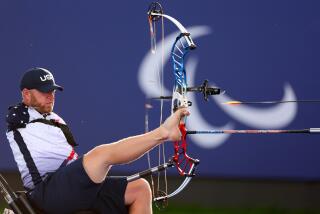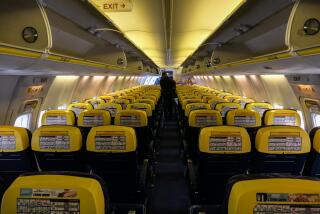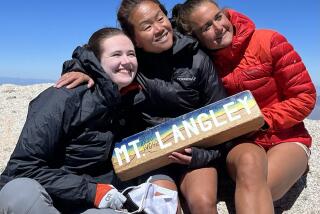Disabled Shed Label in Wilderness Rendezvous : Recreation: A remote Maine town is a sportsmen’s mecca that has become handicapped accessible and bills itself as the first barrier-free town in the nation.
- Share via
JACKMAN, Me. — Amy Phillips grimaced when she first threw the tomahawk--it ricocheted off the target. Her second attempt and the next dozen or so were no better.
Phillips, seated in her wheelchair about 10 yards from the target, kept trying. She learned to snap her wrist, as an instructor advised, so the tomahawk would bite solidly into the wood.
“Now I’ve got it,” she said after her first good throw led to a string of successes. “The whole thing was, I wasn’t throwing it hard enough.”
The tomahawk throw was just one of the events that Phillips tried for the first time during this summer’s Wilderness Rendezvous, a weeklong gathering that provides outdoor recreation for disabled people.
Phillips, injured in a motorcycle accident nearly two decades ago, was among about two dozen people in wheelchairs who competed in rifle and pistol marksmanship, archery and tomahawk throws, practiced fly fishing techniques and learned to get in and out of a canoe.
It was held for the third consecutive year in this remote town along the Canadian border, a sportsmen’s mecca that has chosen to become handicapped accessible and bills itself as the first barrier-free town in the nation.
At least 85% of the motels, restaurants, shops and other businesses in the town of 900 have installed ramps, provided accessible rest rooms and made other renovations to accommodate wheelchairs.
The idea can be traced to a conversation nearly five years ago between Ken Coombs, who owned a hunting camp in Jackman, and Richard Spooner, a wounded Vietnam veteran from Orwell, Vt., who has continued to hunt and fish from his wheelchair.
“He was bemoaning the fact that there was simply not the accessibility to allow him to do the things he wanted (to do),” Coombs recalled. “He explained what had to be done and he got it done.”
Spooner, who went on to work on outdoor recreation programs for disabled people in Vermont, has fond memories of the time he spent in Jackman.
“That community up there opened its arms to people with disabilities like me,” he said. “I’ve always been treated with dignity and respect in that little town.”
There’s a large market for outdoor recreation for the disabled. More than 40 million Americans have some physical handicap that limits their activities, according to government figures.
“It’s a benefit for the handicapped people and a benefit for the town,” said Richard McFarland, an archery volunteer at the Wilderness Rendezvous.
Organizers of the annual event see it as just one element of a more ambitious effort to attract disabled people on a year-round basis for hunting, fishing, snowmobiling and boating.
Disabled Outdoor Experiences, the nonprofit group which coordinates the event, hopes to purchase an 80-acre farm along the Moose River and turn it into a nature center that would be a base for handicapped visitors.
“If everybody is coming up here for a vacation, they’ll need a place where they can hang out, and read and relax,” said Pat Friedman, executive director of the group.
In this bucolic setting, where a dozen Canada geese glided on the surface of a pond on a hot summer day, Friedman evoked images of vacationers in wheelchairs rolling along trails by the river and through the woods.
A large garage and a former dairy barn would be converted into workshops where all-terrain vehicles, boats and snowmobiles could be adapted for use by disabled people, she said.
Some of the competitors in this year’s Rendezvous say their accidents or illnesses haven’t curtailed their competitive instincts or their willingness to try new forms of recreation.
“It’s just a different lifestyle,” said Brad Williams, a Portland police dispatcher who was injured in a motorcycle crash in 1987. “I can do everything I did before. You just do it sitting down instead of standing up.”
Not all disabled people share Williams’ “try anything” approach. Some visitors to the Rendezvous came as observers, checking out the various events before making a commitment.
Organizers attempt to make the events more “user friendly” to people in wheelchairs by suggesting different techniques or adapting some of the equipment to compensate for participants’ disabilities.
More to Read
Sign up for The Wild
We’ll help you find the best places to hike, bike and run, as well as the perfect silent spots for meditation and yoga.
You may occasionally receive promotional content from the Los Angeles Times.






